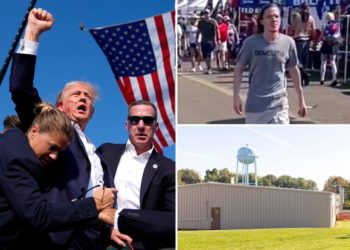Israeli settlers beat and killed a 20-year-old Palestinian-American man during a confrontation in the Israeli-occupied West Bank, and a second Palestinian was fatally shot, according to Palestinian authorities and the families of both men.
The Israeli military did not confirm or deny the deaths, but said there had been a violent exchange on Friday between Palestinians and Israeli civilians near the West Bank town of Sinjil, where the two deaths were reported. The Shin Bet, Israel’s domestic intelligence agency, and the Israeli police were looking into the reported casualties, the military said.
The U.S. embassy in Jerusalem confirmed the death of the man with American citizenship, identifying him as Sayfollah Musallet, but did not address the circumstances. U.S. officials have asked Israel for further details, the embassy said.
Mr. Musallet, 20, was born in Florida and returned to the West Bank last month to visit family, his cousin, Diana Halum, told The New York Times in an interview on Saturday. Ms. Halum and other family members live in Mazraa al-Sharqiya, a nearby Palestinian town.
Mohammad Shalabi, 23, was shot and killed during the clashes, according to Palestinian health officials. It was not immediately clear who shot him: Both armed settlers and Israeli forces were on the scene.
Violence has soared in the West Bank since the start of the Israel-Hamas war in Gaza. The Israeli military occupies the territory, where roughly 2.7 million Palestinians live alongside about 500,000 Israeli settlers.
The United Nations says that more than 850 Palestinians and 40 Israelis have been killed in the West Bank since the Hamas-led Oct. 7, 2023, attack on Israel, which ignited the Gaza war. The semiautonomous Palestinian government in parts of the West Bank is controlled by Hamas’s rivals, the Palestinian Authority.
Israeli forces killed most of the Palestinians during crackdowns on militants, while attacks by extremist Jewish settlers on Palestinian towns accounted for some of the killings. Human rights groups say Israelis who attack Palestinians — whether soldiers or civilians — are rarely prosecuted, creating a culture of impunity that facilities further assaults.
The full chain of events leading to the killings of Mr. Musallet and Mr. Shalabi on Friday night was not immediately clear. The violence unfolded near Sinjil, about 15 miles north of Jerusalem, according to Palestinian officials. There was an hourslong standoff between settlers and Palestinians there, according to witnesses and officials.
The Palestinian Authority Health Ministry said in a statement that Mr. Musallet died after he was “severely beaten” all over his body by Jewish settlers.
Friday’s killings followed weeks of tensions in the area between settlers and Palestinians. Israeli settlers have ensconced themselves on hilltops overlooking Sinjil — land claimed by local Palestinians — and clashed with residents, according to Mohammad Zaban, the mayor of nearby Mazraa al-Sharqiya.
Mr. Musallet’s cousin, Ms. Halum, said one of his brothers saw him being beaten by Israeli settlers. The account was confirmed by another Palestinian witness from Mazraa al-Sharqiya who said he had seen settlers beating Mr. Musallet. He requested anonymity for fear of Israeli retribution.
Another sibling and a friend later reached him, badly wounded but still alive, said Ms. Halum. He died in an ambulance on the way to the hospital.
“His body showed signs of strangulation, a large bruise on his back that looked like it came from a rock, and dirt was found in his mouth,” said Ms. Halum, who said she saw her cousin’s body at a nearby hospital.
The Israeli military said in a statement that the violence began on Friday when Palestinians hurled stones at Israeli civilians, lightly injuring two of them.
“Shortly after, a violent confrontation developed in the area involving Palestinians and Israeli civilians, which included vandalism of Palestinian property, arson, physical clashes, and rock throwing,” the military said.
Mr. Shalabi, the Palestinian man who was shot and killed in the clashes, was missing for hours after the violence, according to his uncle, Samer Shalabi, and Mr. Zaban, the mayor. At first, his family believed he had been arrested by Israeli forces, the two men told the Times on Saturday.
The Israeli authorities later said that he was not in their custody, leading villagers to launch a search. They found his body around 10 p.m. Friday night with a fatal gunshot wound and extensive bruising on his face and neck, his uncle said.
Jonathan Pollak, an Israeli left-wing activist who was at the scene of the violent confrontations near Sinjil earlier in the day on Friday, said he and another Palestinian activist were carrying a wounded Palestinian man away from the site of the clashes Friday when a group of extremist Israeli settlers wielding what looked like police batons set upon them.
Mr. Pollak said he sustained a black eye, while his Palestinian colleague was badly beaten. Israeli forces who arrived on the scene detained both of them, but let their assailants go, he said. The Israeli military did not respond to a request for comment.
“They detained us, took the settlers down the road,” said Mr. Pollak. “And then at some point, we saw the settlers getting into their cars and moving toward the village.”
Over the past two years, the European Union, the United Kingdom and the Biden administration have all imposed sanctions on settler figures and organizations believed to have been involved in violence against Palestinians.
But President Trump quickly revoked the U.S. sanctions shortly after his return to office in January, canceling a Biden-era executive order targeting those who undermined “peace, security and stability in the West Bank.”
Yesh Din, an Israeli rights group that examined more than 1,600 cases of Jewish extremist violence in the West Bank between 2005 and 2023, found that just 3 percent ended in a conviction.
Palestinian Americans say the U.S. government has failed to hold Israel to account when their relatives have been killed or injured by Israeli forces. In April 2025, Amer Rabee, a 14-year-old Palestinian-American from New Jersey, was fatally shot in the town of Turmus Ayya, north of the city of Ramallah.
The Israeli military said he had thrown stones, labeling him a terrorist. His family and a Palestinian teenager who was with him at the time denied that. Amer was shot 11 times by Israeli forces, according to his father.
Rawan Sheikh Ahmad contributed reporting.
Aaron Boxerman is a Times reporter covering Israel and Gaza. He is based in Jerusalem.
The post Two Palestinians Are Killed in a West Bank Clash With Israeli Settlers appeared first on New York Times.




